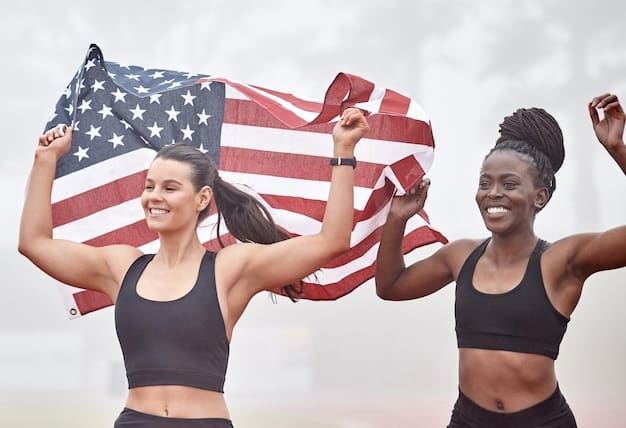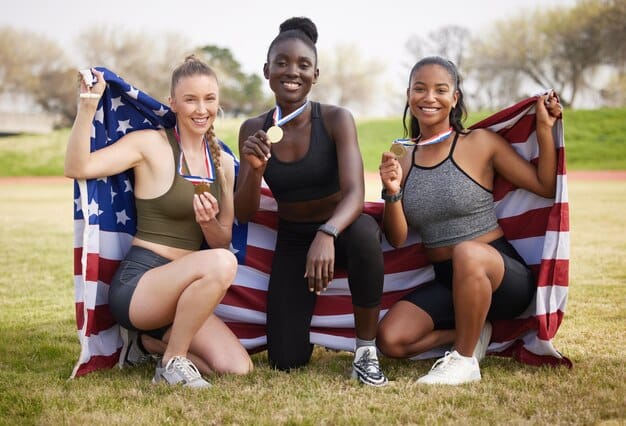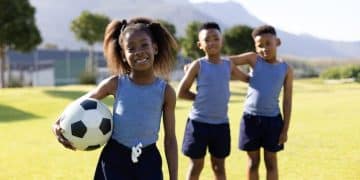Olympic Qualification Changes: Impact on US Athletes for 2028

Proposed changes to the Olympic qualification system could significantly impact US athletes aiming to compete in the 2028 Games, potentially altering pathways to qualification, increasing competition, and requiring adjustments to training and strategy.
The upcoming 2028 Olympic Games in Los Angeles are generating excitement and anticipation among athletes worldwide. However, proposed changes to the Olympic qualification system could significantly impact US athletes striving to compete on their home turf. Understanding how will the proposed changes to the Olympic qualification system affect US athletes in 2028 is crucial for athletes, coaches, and sporting organizations to adapt and strategize effectively.
Understanding the Current Olympic Qualification System
To fully grasp the implications of the proposed changes, it’s essential to understand the current Olympic qualification system. This system varies by sport but generally involves a combination of performance-based criteria, national federation nominations, and quota allocations.
The current system typically prioritizes athletes who achieve specific performance standards or rankings within a designated qualification period. National federations then play a role in nominating athletes based on these results, often considering factors like potential for future success and team composition. Quota allocations ensure representation from different countries and regions, contributing to the diversity of the Olympic Games.
Key Components of the Current System
Several key components underpin the current Olympic qualification structure, influencing how athletes secure their spots.
- Performance Standards: Athletes must meet predefined performance benchmarks to be eligible for selection.
- Ranking Systems: World rankings play a significant role in determining qualification slots, rewarding consistent performance.
- National Federation Nominations: National sporting bodies have the discretion to nominate athletes based on various factors.
- Quota Allocations: This ensures a broad representation of countries, preventing dominance by a few nations.
The current system has been criticized for its complexity and potential for bias, with some arguing that it favors athletes from well-funded nations with established training programs. However, it also aims to balance performance with diversity and representation.

Overview of the Proposed Changes to Olympic Qualification
The proposed changes to the Olympic qualification system aim to address some of the perceived shortcomings of the current system while also aligning with the International Olympic Committee’s (IOC) broader goals of promoting universality, sustainability, and athlete well-being.
These changes vary depending on the sport but generally involve a greater emphasis on ranking systems, a reduction in the number of quota places allocated to host nations, and the introduction of new qualification events designed to promote inclusivity and development.
Specific Proposed Changes
Several specific changes are being considered across different sports, each with potential implications for US athletes.
- Increased Reliance on Ranking Systems: A greater weighting of world rankings in determining qualification spots.
- Reduction in Host Nation Quotas: Limits the number of guaranteed spots for athletes from the host country.
- Introduction of New Qualification Events: Creates opportunities for athletes from emerging nations to qualify.
- Emphasis on Universality: Ensures participation from a wider range of countries and regions.
These proposed changes aim to create a more level playing field, reducing the influence of national federations and promoting a more merit-based system. However, they also introduce new challenges and uncertainties for athletes and sporting organizations.
Impact on US Athletes: Opportunities and Challenges
The proposed changes to the Olympic qualification system present both opportunities and challenges for US athletes. On one hand, a greater emphasis on ranking systems could benefit US athletes who consistently perform well in international competitions. On the other hand, a reduction in host nation quotas could make it more difficult for US athletes to secure a spot in the 2028 Games.
For US athletes, the increased reliance on ranking systems means that maintaining a high world ranking throughout the qualification period will be crucial. This requires consistent performance in international competitions, strategic planning of competition schedules, and access to high-quality training facilities and coaching.

Potential Benefits for US Athletes
Despite the challenges, some of the proposed changes could benefit US athletes.
- Merit-Based System: A greater emphasis on rankings rewards consistent performance and high achievement.
- Increased Competition: Can drive US athletes to push their limits and improve their performance.
- Strategic Planning: US athletes may need to adapt their training and competition schedules to maximize ranking points.
Overall, the impact of the proposed changes will depend on how effectively US athletes and sporting organizations adapt to the new qualification landscape. This requires proactive planning, strategic decision-making, and a commitment to continuous improvement.
Strategies for US Athletes to Adapt to the New System
To successfully navigate the proposed changes to the Olympic qualification system, US athletes will need to adopt new strategies and approaches. This includes focusing on consistent performance, strategic competition planning, and leveraging resources to maximize ranking points.
Consistent performance in international competitions is critical for maintaining a high world ranking. Athletes should prioritize events that offer significant ranking points and avoid complacency, as even minor setbacks can impact their overall standing.
Key Strategies for Adaptation
Several key strategies can help US athletes adapt to the new qualification landscape:
- Focus on Consistent Performance: Maintain consistently high performance in international competitions to secure ranking points.
- Strategic Competition Planning: Carefully plan competition schedules to maximize opportunities for earning ranking points.
- Resource Optimization: Leverage resources such as high-quality training facilities and expert coaching.
By adopting these strategies, US athletes can increase their chances of qualifying for the 2028 Olympic Games and representing their country on the world stage.
The Role of US Olympic and Paralympic Committee (USOPC)
The US Olympic and Paralympic Committee (USOPC) plays a crucial role in supporting US athletes and helping them navigate the complexities of the Olympic qualification system.
The USOPC provides resources, funding, and guidance to athletes, coaches, and national governing bodies. It also advocates for US interests within the international Olympic movement and works to ensure that US athletes have a fair and equitable opportunity to compete.
USOPC Support Mechanisms
The USOPC provides various support mechanisms to help US athletes succeed:
- Financial support through grants and sponsorships.
- Access to world-class training facilities and coaching.
- Medical and psychological support services.
- Guidance on navigating the Olympic qualification system.
In light of the proposed changes to the Olympic qualification system, the USOPC will need to play an even more active role in supporting US athletes. This includes providing updated information on the new qualification criteria, helping athletes develop strategic competition plans, and advocating for fair and equitable rules within the international Olympic movement.
Long-Term Implications for Olympic Sports in the US
The proposed changes to the Olympic qualification system could have long-term implications for Olympic sports in the US. This includes potentially altering funding priorities, shifting the focus of athlete development programs, and influencing the overall competitiveness of US athletes on the international stage.
If the changes lead to a greater emphasis on ranking systems, national governing bodies may need to allocate more resources to supporting athletes who consistently perform well in international competitions. This could mean shifting funding away from grassroots development programs and towards elite training initiatives.
Ultimately, the long-term implications of the proposed changes will depend on how effectively US athletes, coaches, and sporting organizations adapt to the new qualification landscape. This requires a strategic, proactive, and collaborative approach to athlete development and international competition.
| Key Aspect | Brief Description |
|---|---|
| 🥇 Ranking Importance | Increased reliance on world rankings for Olympic spots. |
| 🌎 Host Nation Quotas | Potential reduction in guaranteed slots for US athletes. |
| 🌱 Emerging Nations | New qualification events promoting inclusivity. |
| 🇺🇸 USOPC’s Role | Crucial support and guidance for US athletes. |
Frequently Asked Questions
▼
The new ranking system will place a higher emphasis on consistent performance in international competitions, requiring US athletes to strategically plan their competition schedules and maintain high performance levels to secure favorable rankings.
▼
Reduced host nation quotas could make it more competitive for US athletes to qualify for the 2028 Olympics, as fewer guaranteed spots mean they will need to perform exceptionally well to secure their place.
▼
The USOPC is providing updated information, strategic planning assistance, and advocating for fair rules to help US athletes navigate the new qualification criteria and maintain a competitive edge.
▼
US athletes can focus on consistent high performance, strategically plan their competition schedules to maximize ranking points, and leverage resources provided by the USOPC, such as high-quality coaching and training facilities.
▼
The changes could drive US athletes to push their limits and improve their performance, potentially enhancing their competitiveness, but it may also require a shift in funding priorities and athlete development programs to maintain their edge.
Conclusion
In conclusion, the proposed changes to the Olympic qualification system present both opportunities and challenges for US athletes aspiring to compete in the 2028 Games. By understanding these changes, adapting their strategies, and leveraging the support of the USOPC, US athletes can increase their chances of success and continue to represent their country with pride on the world stage.





